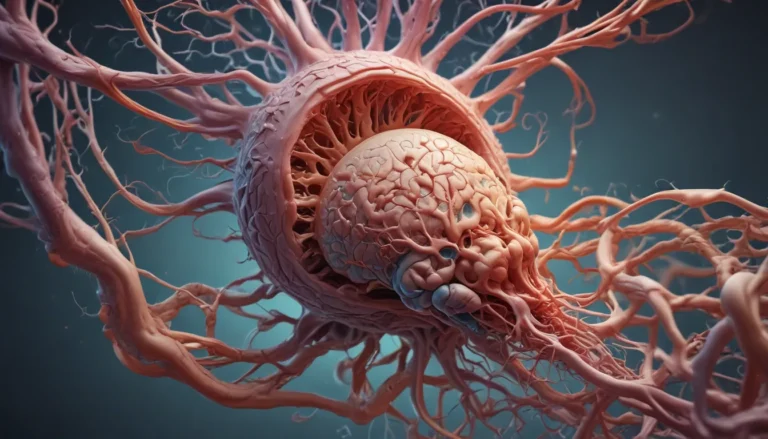A Note About Images: The images used in our articles are for illustration purposes only and may not exactly match the content. They are meant to engage readers, but the text should be relied upon for accurate information.
Parasitism, a unique symbiotic relationship where one organism benefits at the expense of another, is a captivating and often misunderstood concept in the realm of biology. From mind control to sex-changing parasites, the world of parasitism is filled with wonders and mysteries that continue to intrigue scientists and nature enthusiasts alike. In this article, we will delve into some of the most fascinating and enigmatic facts about parasitism, shedding light on the complexity and diversity of this phenomenon.
The Intriguing World of Parasitism
Parasitism: A Widespread Ecological Phenomenon
Parasitism occurs in various ecosystems and impacts a wide range of organisms, including plants, animals, and humans. Surprisingly, over 40% of all known species are parasites, underscoring the prevalence and significance of this unique relationship in the natural world.
Strategies of Parasites for Survival and Reproduction
Parasites rely on their hosts for sustenance and reproduction, employing various strategies such as feeding on tissues, consuming nutrients, and utilizing hosts as breeding grounds. Their ability to exploit hosts showcases the evolutionary adaptations they have developed to thrive in their environments.
The Intricate Dance of Co-evolution
Parasites and hosts engage in an evolutionary arms race, where hosts develop defenses against parasites, and parasites evolve countermeasures to overcome these defenses. This ongoing dynamic highlights the intricate interactions between parasites and their hosts.
The Impact of Parasitism
Balancing Acts: Negative and Positive Impacts
Parasitism can have both negative and positive effects on host populations. While parasites can cause diseases, reduce host fitness, and even lead to death, they also contribute to ecological balance and biodiversity by regulating host populations and influencing species interactions.
Role in Ecological Food Webs
Parasites play crucial roles in ecological food webs by influencing population dynamics and nutrient flow. Their interactions with hosts have far-reaching effects on ecosystem stability and functioning, underscoring their importance in maintaining ecological balance.
Health Impacts on Humans
Parasitic infections, such as malaria, schistosomiasis, and Lyme disease, pose significant health risks to millions of people worldwide. Understanding these diseases is vital for developing effective treatment and prevention strategies to safeguard human health.
Intriguing Adaptations and Behaviors
Remarkable Adaptations of Parasites
Parasites have evolved fascinating adaptations to ensure their survival, from mimicking host appearances to possessing specialized structures for attachment. These adaptations enable parasites to thrive in diverse and challenging environments.
Manipulation of Host Behavior
Some parasites, like Toxoplasma gondii, can manipulate the behavior of their hosts to enhance their chances of transmission. This ability to influence host behavior showcases the intricate strategies parasites employ to ensure their life cycle continues.
Host Specificity and Complex Interactions
Certain parasites exhibit high host specificity, only infecting particular host species or a narrow range of hosts. This specificity often reflects the co-evolution between parasites and their preferred hosts, showcasing the complexity of parasitic relationships.
Unveiling Fascinating Parasitic Realities
Sex-Changing and Reproductive Manipulation
Parasites like Sacculina can alter the sex of their hosts, converting males into females to ensure the survival and transmission of their offspring. These reproductive manipulations highlight the remarkable adaptations of parasites in perpetuating their life cycles.
Health Implications and Immune Interactions
Parasites have evolved various strategies to evade or suppress host immune responses, allowing them to persist and reproduce within their hosts. Understanding these immune interactions is crucial for developing targeted treatments for parasitic diseases.
Cascading Effects on Ecosystems
The presence of parasites in certain species can have cascading effects on ecosystem dynamics, influencing community interactions and species relationships. These indirect effects underscore the interconnectedness of organisms within ecosystems.
Exploring the Diverse Facets of Parasitism
The enigmatic world of parasitism continues to captivate researchers and enthusiasts alike with its complexities and mysteries. By unraveling the intricate relationships between parasites and hosts, we gain valuable insights into the dynamics of ecosystems and the delicate balance of nature. As we delve deeper into the realm of parasitism, we unearth new discoveries that unveil the astonishing diversity and adaptability of parasitic organisms.
FAQs about Parasitism
-
What is parasitism?
Parasitism is a symbiotic relationship where one organism benefits at the expense of another. The parasite depends on the host for survival and reproduction. -
Are all parasites harmful?
No, some parasites form mutualistic relationships with their hosts, benefiting both organisms. These mutualistic parasites play essential roles in various ecosystems. -
Can parasites infect non-animal hosts?
Yes, parasites can infect a wide range of organisms, including plants, fungi, and even other parasites. Their adaptability allows them to exploit diverse hosts and environments. -
How do parasites locate hosts?
Parasites utilize various mechanisms, such as chemical cues and behavioral manipulation, to find and infect hosts. These strategies facilitate their transmission and ensure their survival. -
Can parasites influence host behavior?
Yes, parasites can manipulate host behavior to enhance their chances of transmission. These behavioral modifications range from subtle changes to drastic alterations that benefit the parasite’s life cycle.
Intrigued by the captivating world of parasitism? Explore the enthralling subject further with our range of articles. Dive into the realm of parasitic diseases and their impact on human health or discover surprising facts about the adaptations and life cycles of helminth parasites. Expand your knowledge and satisfy your curiosity with our engaging reads that shed light on the complexities of the parasitic world.
Conclusion: Unveiling the Intricacies of Parasitism
Parasitism, with its enigmatic complexities and remarkable adaptations, offers a glimpse into the intricate web of life on our planet. By studying parasites and understanding their interactions with hosts, we unravel the mysteries of ecosystems and gain insights into the delicate balance of nature. As we continue to explore the world of parasitism, we uncover new revelations that broaden our understanding of the diverse forms of life that coexist on Earth.
Our commitment to delivering trustworthy and engaging content ensures that each fact shared on our site is credible and informative. With contributions from real users like you and diligent editorial review, we strive to provide accurate and fascinating insights to enrich your learning experience. Trust in our dedication to quality as you embark on a journey of exploration and discovery with us.
Remember, the enigmatic facts about parasitism remind us of the incredible diversity of life forms and the complex adaptations that have enabled them to thrive in their environments. Embrace the wonder and mystery of the parasitic world as you delve deeper into its intricacies and revelations.






